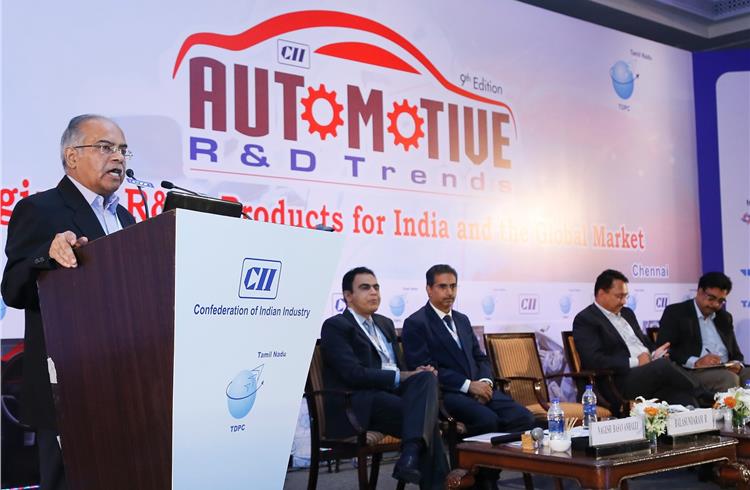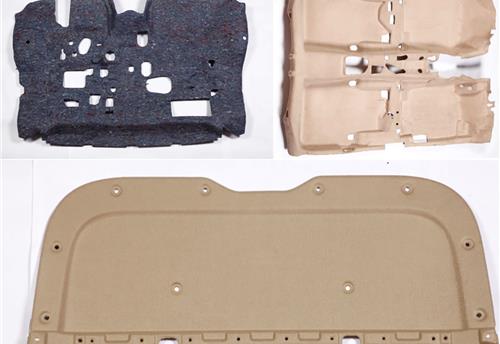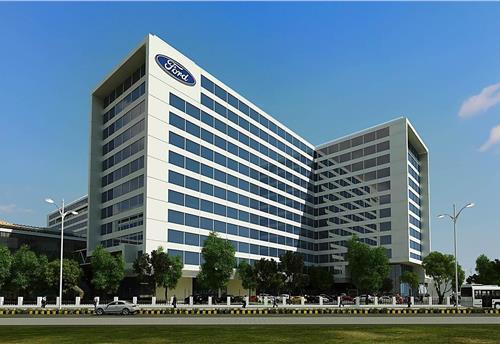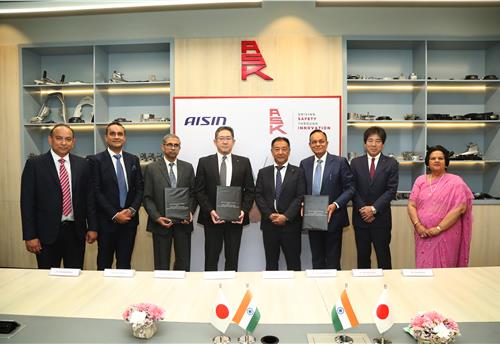How India can play a key role in global automotive R&D
‘Automotive R&D Trends’ conference in Chennai sees captains of the Indian auto industry debate and discuss measures to drive home India’s advantages.
Innovation, research and development and India are fast becoming connected buzzwords for the global automotive world. But is the country doing enough to capitalise on this positive mindset?
The emergence of hybrid and electric vehicles, connected and autonomous cars, digital technologies as well as increasingly stringent emission and safety regulations are driving global R&D activity and vehicle manufacturers are looking to stay ahead of the curve by investing in new technologies and coming up with innovations. Given India’s vast engineering skills and massive worker talent, can the country essay a key role in the future of automotive R&D? This constituted the bulk of the discussion at the ninth conference on ‘Automotive R&D Trends’ held in Chennai on March 9,.
Organised by The Tamil Nadu Technology Development & Promotion Center of the Confederation of Indian Industry (CII) on the theme of ‘Strategising R&D: Products for India and the Global Market’, a panel of eminent industry speakers discussed the relevance of the IC engine, future of diesel as an automotive fuel, complexities in manufacturing and changing regulations and the growing role of R&D to face the massive disruption industry is encountering.
Attended by over 300 industry delegates from companies such as Ashok Leyland, Daimler India, TVS Motor, Bosch and others, the day-long conference deliberated on pertinent issues in various sessions on topics such as ‘Automotive R&D Mega Trends -Global Perspective & Indian Standpoint’, ‘Safety and Integrated mobility’, ‘Affordability & Competitiveness’, and ‘Industrial IoT - Industry 4/0 Impact on Auto Sector’.
Toyota and sustainability
In his welcome address, Vikram Kirloskar, deputy chairman, CII (Southern Region) and vice-chairman, Toyota Kirloskar Motor, said, “In today’s world, R&D is guided not only by customers and their perceived needs but also by what society needs. As an industry, we have to look at what society needs in terms of environment and safety. Product planning and R&D will help in growing sustainably in harmony with nature.”
Elaborating on the efforts that corporations are making to reduce global warming, he said, Toyota Motor Corporation has taken a mandate on itself to reduce CO2 emission in the entire value chain to zero by 2050 – not only in products but right from the manufacturing and plants to everything. “R&D engineers need to look at new technologies to deal with the challenges that industry is facing such as alternate energy sources including electrics and hybrids to make safer and better vehicles for society and the environment in order to make India a safe place for future generations.”
Addressing the conference as chief guest, Ambuj Sharma, additional chief secretary/industries commissioner and director of industries and commerce, government of Tamil Nadu, said: “In the R&D and product development there are three key major stakeholders – the government, OEMs and consumers as entire R&D has to been driven from the regulatory aspects.”
He said the government has set up world-class infrastructure for testing and R&D and urged automotive companies to use the NATRiP facilities for their product development and for pushing their global R&D capabilities.
Stressing the need for collaboration between companies, government and private agencies to work on new and emerging technologies to achieve economies of scale, he said, the government can play a big role to bring together different stakeholders and provide a win-win situation to achieve the desired results faster and quicker.
In a special address, Balasundaram R, executive director (Manufacturing), Ford India, discussed new trends emerging in the automotive industry such as electric vehicles, connectivity, fuel cells, hybrid-electric vehicles and growth in emerging markets. Speaking about R&D in India, he said, engineers in India need to work on basic and fundamental research where there are plenty of opportunities.
R&D-impacting trends
Nagesh Basavanhalli, MD and CEO, Greaves Cotton, highlighted the vast engineering skills available in India and said in the automotive product development system the biggest influence in the value chain is cast by product development and R&D engineers.
He said the future of the automotive world is moving towards electric, digital and shared solutions and how R&D teams are preparing for these multiple and simultaneous disruptions. He underlined six significant trends that are going to impact the R&D function – energy transformation, asymmetric competition, safety, autonomous vehicles, material science, connectivity software and digital. Recognising India’s space mission he said, “We have done great work with frugal spending in our space programme. That is the strength of Indian engineers. I believe there is an opportunity to be an innovator to disrupt.”
Participating in the panel discussion of ‘Make in India-Manufacturing Capital for Emerging Markets’, Gajanan Gandhe, managing director, IAC Asia, said, “The Make In India initiative was excellent to get things started in bringing investment in India. However, the government has to work on four key areas including how to create domestic demand, push infrastructure, improve labour policies and the ease of doing business.”
Need for equitable spread of manufacturing sector
Speaking on why India has not been able to spread its manufacturing eco-system across the country, Mantha Venkataramana, CEO, Assystem Technologies, said, “The Centre and State policies need collaboration to avoid concentration of the manufacturing industry in select states. This will bring a labour arbitrage disadvantage to India against developed countries in the next 10-15 years and have a negative effect on growing Indian manufacturing industry. If the government of India can streamline this policy, skilled people will get distributed across various states in India and will not adversely impact India’s aspiration to become the third largest manufacturing hub in the world after the USA and China.”
Answering a question on keeping India’s cost competitiveness intact, Venkataramana said, “Besides the labour advantage, India can have its competitive edge through a technology advantage especially in areas like connected cars, infotainment and ADAS given that India has huge software knowledge and this could be a differentiator.”
In the first plenary session on ‘Automotive R&D Mega Trends - Global Perspective & Indian Standpoint’, Ashok Belani, Group president and MD, Valeo India, discussed several technologies the company is working on. These are largely in the areas of connected and automated cars, electrification and the shifting innovation from driver-centric interfaces to the mobility side of driving.
P A Lakshminarayanan, chief technical officer, Simpson Company, shared details on two compact engines developed by the company for the off-road segment, largely for the agricultural market. Both these engines are Euro 5 standard and expected up satisfy Indian emission standards till 2026 and beyond.
Other speakers from key companies including AMW, Simpson, Siemens, Cholamandalam MS, ETAS India, Minda Corporation, Ricardo India, Continental Automotive Components, Wheels India and Tube Investments also spoke on key and emerging trends in various sessions.
Also read: Tamil Nadu to introduce new focused policy for automotive MSMEs
RELATED ARTICLES
Uniproducts India targets 15% growth till FY2027, eyes new EV OEMs for NVH parts
The Noida-headquartered company, which is a leading manufacturer of roof liners, floor carpets, sound insulation materia...
Ford to build more EV software capability at Chennai tech hub
Ford Business Solutions India, which currently employs 12,000 personnel set to add 3,000 more; Ford, which is known to b...
ASK Automotive to set up JV with Aisin to sell aftermarket parts for cars
Ask Automotive will have 51% of the equity of the joint venture to be set up with Aisin Asia (Thailand) Company and Aisi...





 12 Mar 2017
12 Mar 2017
 17990 Views
17990 Views





 Autocar Pro News Desk
Autocar Pro News Desk




